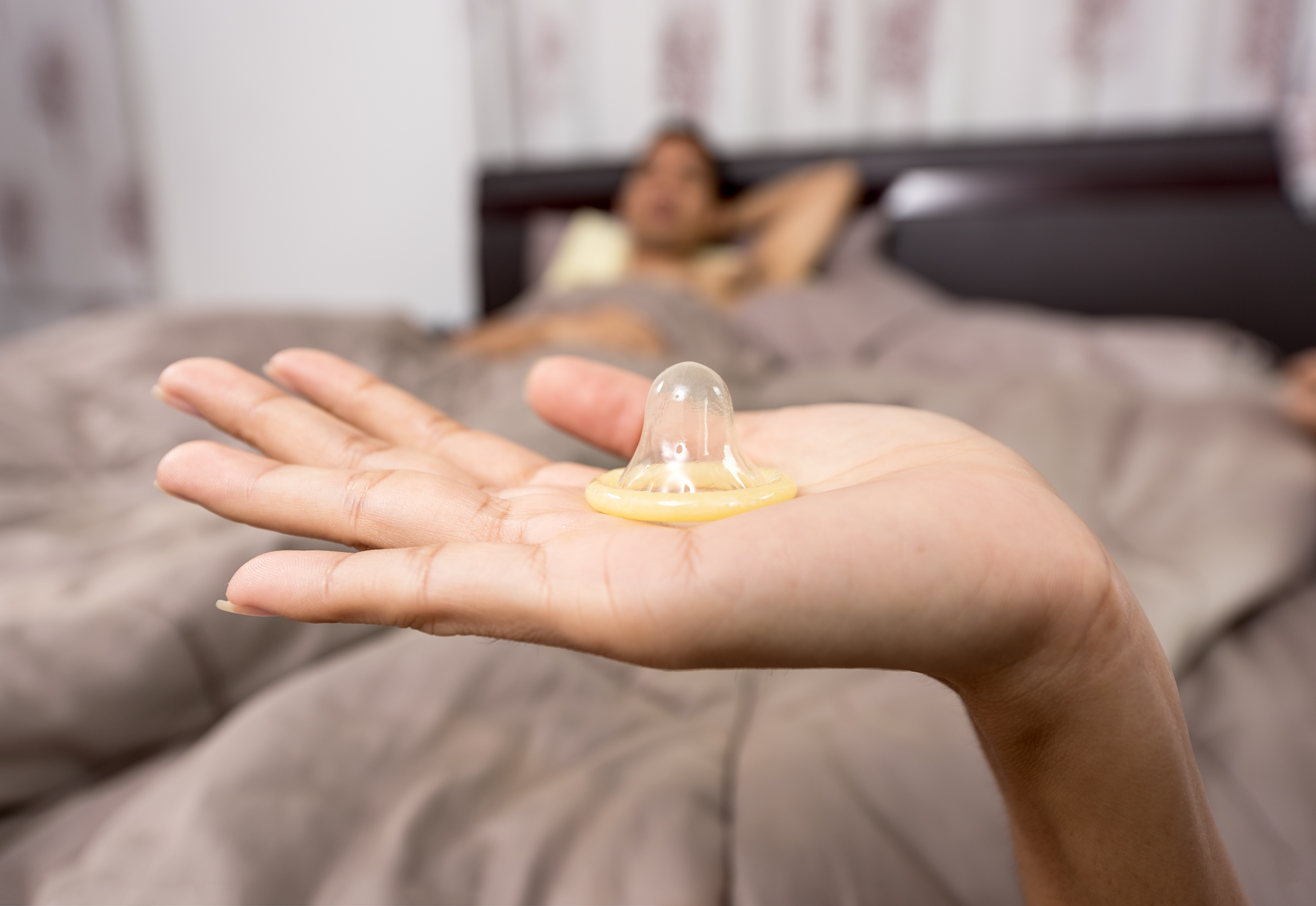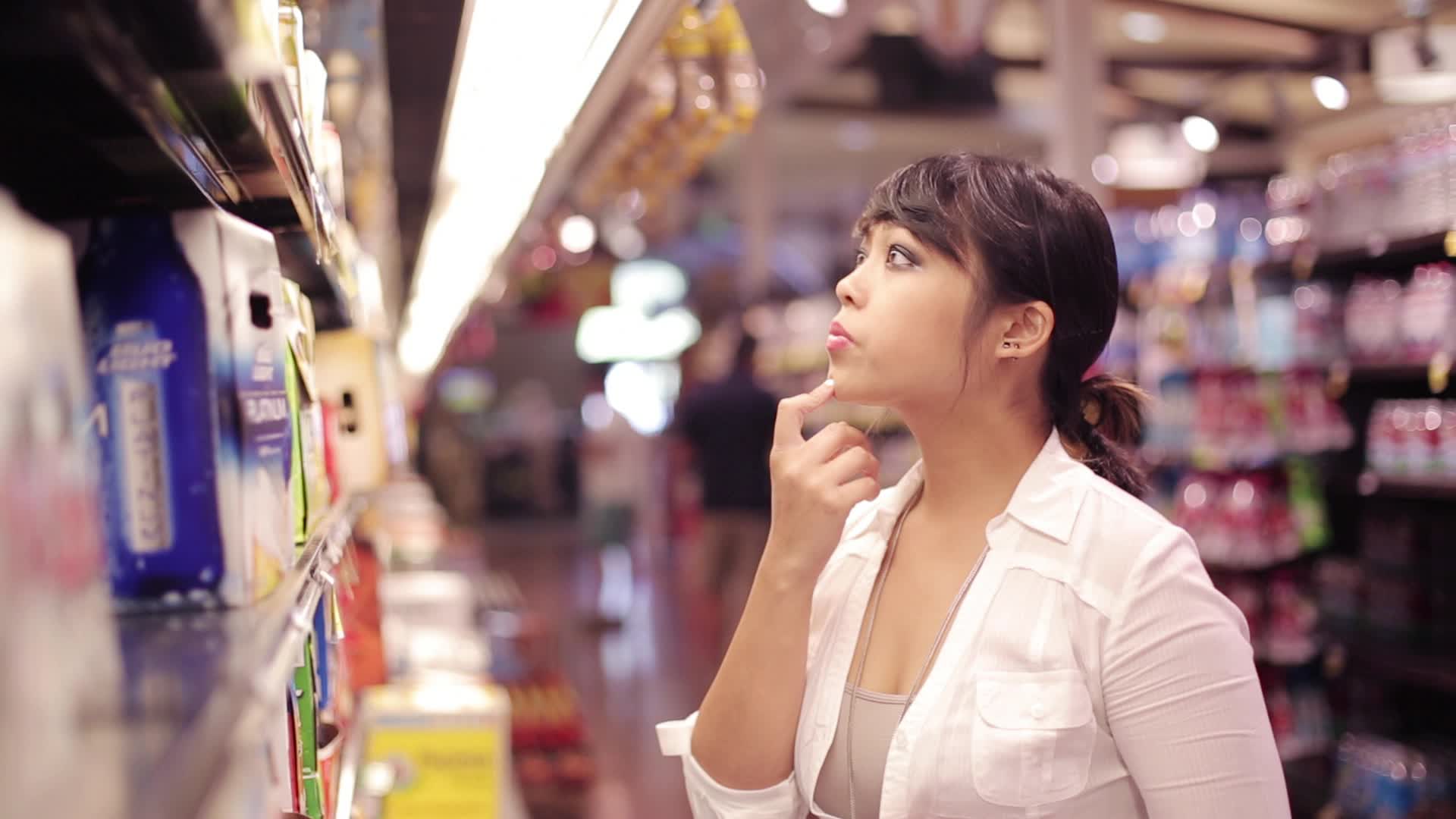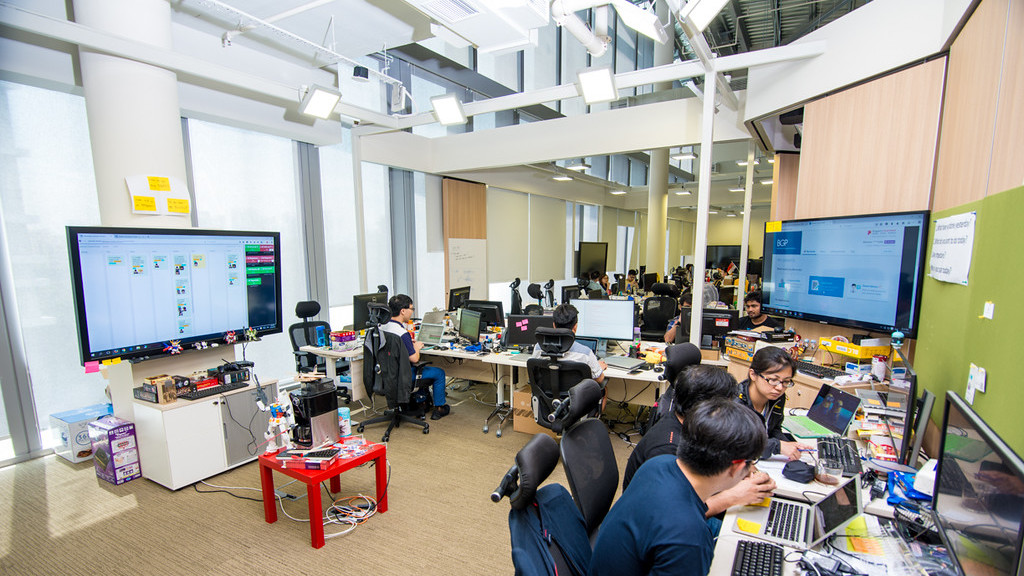First comes the proposal, then the wedding, and then the house. This was once the norm, but not anymore.
In Singapore, when you’ve been in a relationship for a reasonable amount of time, you can expect your partner to ask you one crucial question: “Want to BTO?”
Today, many couples apply for a BTO (Build-To-Order) flat before proposing. Marriage comes a little later, and it can happen before or after getting the keys to their home.
Logically, it makes more sense. It's pragmatic, as the wait for a BTO can be (dreadfully) long. The completion of BTO projects can take around 2.5 to 5 years. And let’s face it. Getting a house in Singapore is stressful. In fact, it’s downright terrifying.
It doesn’t matter if you’re in a relationship or if you’re single, buying a house here is crazy expensive despite the various grants available. It’s also incredibly difficult because you’re competing with hundreds of other buyers bidding for the same flat you wish to get. And when you are getting something which you will most likely have to continue paying for for the next 20 to 30 years, you can expect everyone to 'fight' for their ideal choice.
This competitiveness for a BTO forces many young Singaporeans to commit themselves into a relationship when they may not exactly be ready.
THE PRESSURE TO FIND LOVE FASTER
Because of the amount of time it takes for you to successfully get the keys to your new home, it means having to find the person you are 'meant to be with' a lot faster.
I know of singles in their mid 20s who are still working on finding the right person to date, let alone have a relationship with.
Dating itself has become a more daunting task than before. From the get-go, we start thinking about whether we see a future with this person, because we no longer have time to spend on someone whom we’re not going to spend the rest of our lives with.
A lot of singles in their mid and late 20s go into their first date hoping that it’ll be their last first date. We’re no longer dating to date, but we’re dating for marriage. I’ve even heard a couple of my singles friends tell me, “I want my next boyfriend to be my last one.”
Sophia, 25 and single, shared how she goes into every first date subconsciously analysing everything about her date, to get a sense of whether she sees herself spending the rest of her life with him.
“First dates used to be about having a good night out while getting to know someone,” she shares. “Now I find myself thinking about stuff you’d usually only start thinking about after knowing someone for a couple of months like “Does he want kids?” and “How religious is he?””
As much as it stinks for people like Sophia, who thought dating would be “fun and enjoyable”, buying a house in Singapore means having to think about our future a lot quicker.
It's not a bad thing to date with the purpose of marriage of course, but it may not necessarily be a good thing to be bogged down by the practicalities of what is seemingly a talk for much later on. While applying for a BTO is a great way to get us to plan for our future early, it also, in a lot of ways, ruin romance.
IS OUR HOUSING SYSTEM A CURSE?
But it’s not just the singles who are stressed out. Couples are having to commit to the person they are with a lot earlier in their relationship. And while that’s not exactly a problem, it does provide immense pressure to someone who's not ready for that level of commitment, while facing their partner who is.
No longer do we have ample time in our hands to enjoy the ‘honeymoon phase’ of a relationship. While there are the lucky few who stay with their school sweethearts for 10 years, a lot of us only find “the one” somewhere in our mid 20s.
But there are instances where despite having your lives planned out together, relationships simply don’t work out.
What happens when you have a BTO on your way, and you realise that you can no longer see a future with the person you are with?
I was surprised to find that there wasn’t a lack of post-BTO breakup stories within my circle of friends alone.
Alvin, 27, went through a breakup with his girlfriend of four years after they had successfully balloted for their home last year.
“She said that she didn’t see a future with me anymore and just needed some time for herself,” he shared. “It was later that I found out there was another guy.”
“I guess no matter how much you plan for something, sometimes life just kicks you in the nuts,” Alvin laughed.
A breakup was the last thing he had expected to happen, especially at a stage of his life where he thought he had his future all planned out.
What makes BTOs all the more scary are the implications that cancelling your application causes.
There’s no doubt that you end up forfeiting the money that you’ve invested, depending on how far along in the process you are.
You also lose your first-time applicant advantages, and if you want to apply for a BTO with your next partner, or as a single, you have to wait at least a year to be able to do so.
“It sucks that the implications of forfeiting a BTO are so costly, literally,” Alvin says. “But at least it’s taught me to take my time and not rush into settling down with someone.”
Samantha, 25, whose boyfriend also broke up with her after applying for their BTO together, believes that a BTO is an expectation created by society.
“Instead of asking, 'Proposed already ah?', people ask, 'BTO already ah?' which I think indirectly gives couples a lot of pressure to get a BTO.”
It seems like we assume getting a BTO guarantees a relationship. But there rarely is ever a guarantee on anything.
“A lot of couples rush into getting a BTO because they think that might give them some ‘security’”, she shared. “But that shouldn’t be case, you should apply for a BTO because you’re secure about your relationship.”
SOMETIMES YOU JUST WORK THROUGH IT
It’s normal to feel unsure about your relationship and stumble onto rough patches along the way. The stress that comes with the BTO doesn’t help either. What was meant to be a significant part of a couple’s life has become a stressful endeavour instead.
Couples who have successfully gotten their house have had their own share of rough patches along the way. But these couples found a way to set things on track to start building their future with their partners.
Mabel, 28, who has now secured her home through Sales of Balance (SFB), wasn’t sure if she was ready to commit to her boyfriend of 3 years before they applied for it in May 2018.
“I didn’t know if I was ready to commit,” she shared. “Because it’s not only about committing to a house, but committing to the rest of my life ahead of me.”
“Whenever we spoke about applying for a BTO, a part of me wanted it, but the other part was also scared.”
Today, Mabel and her fiancé have the keys to their house, and will be getting married in a few months' time.
“When I told my fiance about my fears, we talked about it and decided to make it work together,” she continued. “I saw his efforts in trying to make our relationship work and I just wanted to do the same.”
For Alexa, 25, applying for a BTO was a natural next step in their relationship. When they applied for their BTO, they had been together for two years and knew they were ready for the commitment.
Yet, it was after they were successful in their ballot that Alexa’s relationship hit a rough patch.
“That ‘ready’ feeling became very different as we went through a seriously rough patch that really made us think if we should move forward,” she shared.
Like anyone else in her position, Alexa didn’t want to go through the hassle of withdrawing their application.
“There was definitely a lot of pressure because this was an investment we had gotten ourselves into.” she continued. “This really showed me that the BTO system can really be a burden.”
While in many ways, having a BTO on the line does encourage you to make things work with your beau and give your relationship another chance, it doesn’t allow you to consider your relationship rationally.
“We had to tell ourselves to consider the future of our relationship as if there was no BTO involved,” says Alexa. “Because we knew that if we let the BTO decide our future, we wouldn’t be happy.”
Fortunately, Alexa and her boyfriend managed to get past their rough patch and are eager to start their life together today.
DON’T JUMP THE GUN
It’s normal to have the urge to jump on a bandwagon that everyone around you is on. We all want to have a great home by the age of 35. We all have an ideal ‘plan’ of where we want to be by the time we’re in our late 30s.
Despite being single for the past two years, Jason, still has no qualms about rushing into a relationship at 27.
“I get that in Singapore, settling down with someone takes a lot more time. But I would much rather wait until 35 and get my bachelor pad than get a BTO with someone I'm unsure about,” shares Jason. “Singlehood doesn’t scare me, being with the wrong one does.”
BTOs should be a mere stepping stone into the future you want to build, it shouldn’t be the foundation of it.
“Your future shouldn't depend on getting a BTO,” says Alexa. “It’s better to be 30 and single than to be with someone you’re unsure about.”
Also read: Hustle Together, Stay Together - These Singaporean Couples Prove That Office Romance Can Work
THE CASE AGAINST SECRET SANTA
To make gift-giving more “exciting”, someone decided to invent the phenomenon we know today as Secret Santa. In today’s world, Secret Santa has made its place in the modern workplace. If you work in an office, chances are that you have, willingly or not, been a part of this annual office tradition.

IS IT AN OBLIGATION?
It’s not just Christmas. We present people with gifts on birthdays, housewarmings, graduations, weddings… the list is endless. There’s an enigmatic beauty about gift-giving. Gift-giving, by its definition is not an obligation. Gifts are items given without the expectation of getting anything in return. They are symbolic representations of relationships and tokens of appreciation. To some people, gift-giving is a main language of love. My dad has always made it a point to bring a bottle of Coke or a box of chocolates to a relative or friend’s home every time he visits. To him, it’s a way of appreciating the host for their hospitality. But for that reason, he’s noticed that his friends have become obliged to get him something every time they visit us too. Which isn't exactly a bad thing, but it does create a silly 'new tradition' where we continue to buy gifts not out of appreciation, but because we are expected to do so. Let’s just take birthdays for example. If you’re invited to someone’s birthday, you’re expected to bring a gift. It doesn’t matter how well you know this person. Showing up empty-handed is not an option. How many of us have been invited to a birthday and brought a box of Ferrero Rocher as a present? A box of Ferrero Rocher screams “I don’t know you but I was forced into coming here so here you go.” It doesn’t hold meaning and goes against everything a gift is supposed to stand for.MAKE IT SPECIAL AGAIN
I’m not saying that Secret Santa is a shit practice, or that we should limit ourselves to buying gifts only for the people we truly like. But when gift-giving becomes an obligation, it starts to feel like a chore. If gift-giving was meant to bring people together, it’s lost its purpose in recent years. Instead of being excited to buy things, we find ourselves in a state of panic as we realise we don’t know what to get. Maybe it’s time we stopped to think about why we were giving a gift before actually giving it. Are we gifting because we don’t want to feel embarrassed? Do we expect something back in return? Or are we giving it simply because we want to see the other party happy? Also read, This Is Why Wearing Heels Is Empowering And F*cking Sexy (Header Image Credit: @kadh on Unsplash)1. IT WAS AN ACCIDENT
I only masturbated when I was 18 because I always thought it was a “dirty” deed from the way my friends used to tease each other about it. But one night, I was lying on my bed and hugging my bolster while watching a movie clip that turned me on. That’s when I impulsively began rubbing my legs against my penis (with my clothes on). I remember it feeling damn good. I kept rubbing until... yeah, it came out. Did I accidentally masturbate? Maybe. - Riduan, 21
2. BOYFRIEND WANTED TO WATCH
The first time I masturbated wasn't by choice. I was 18 and I only did it because my boyfriend wanted to watch me touch myself. It felt like my body wasn’t even mine. I haven’t done it since we broke up. - Jas, 213. LATE-NIGHT GAMING
I was a 15-year-old who was really into this massively multiplayer online role-playing game (MMORPG). One night I decided to strip one of the female characters naked (well, almost naked because I couldn’t remove their underwear). I don’t know what made me think that I should rub myself, but I did. But after the wave of pleasure passed, I quickly put my clothes back on because I felt dirty. - Wei Jie, 25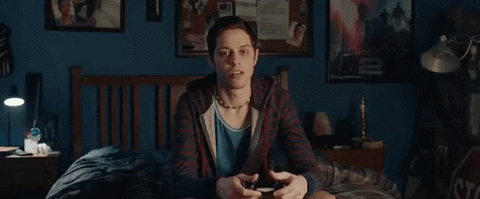
4. OUT OF BOREDOM
I was 18 or 19 and wanted to try it out for myself, having heard how great it feels. I went online and googled tips on masturbating. During school break, I was home alone and decided to try it out. It was horrible and uncomfortable. I didn't use porn or anything. I thought you didn't have to be horny to masturbate, I thought it was just something you could do when you were bored. - Aisyah, 255. THE ABSENCE OF A GIRLFRIEND

6. SINNERS GO TO HELL
I was 13 years old and my friends were talking about some website in class, so we went to one dude's house to check it out after school. We realised it was porn, and us being guys, we just kept on scrolling. Then one of my friends asked us if we had jerked off before. Most of us didn’t know what that meant, so he explained it to us. That night I went home to the same website and tried jerking off. I felt a mix of emotions after, but being Christian, I remember thinking I’d committed a sin and I’m going to hell. - Jason, 26
7. AT THE AGE OF 4
I was 4 years old, and I didn't know what it was or what I was doing, I just knew that if I pressed my genitals onto something, it will feel good. There was once when my mum caught me in the act and interrogated me, asking me who I learnt that from. That made me think that I did something wrong, because why else would I get chided for it? - Sophia, 198. WERKING THE POLE

9. I THOUGHT I WAS ABNORMAL
When I first masturbated at the age of 17, it was because I was curious, and wanted to know what feeling 'sexually satisfied' felt like. I'd only heard of guys doing it and that made me think that I was 'abnormal' because I, a female, also had sexual urges. And even though I enjoyed it, I also felt guilty. I felt like I was doing something 'wrong'. My parents never talked to me about it, so I automatically assumed that it was something clandestine. - Cheryl, 2710. A STOOL AND A TOILET ROLL
I was 11 and simply curious and interested. So I tried to f**k the hole in the stool. Didn’t work. Tried to use a toilet roll, didn’t really work too. Tried my hand, finally worked. But after that it felt weird and I thought that I needed to pee. Oh, and I also felt dirty. - Daniel, 24
WHY THE GUILT?
A lot of these stories have one thing in common - the feeling of guilt. Many of these stories end with the individual feeling dirty or ashamed. For some of us, our religion tells us that it's a sin. For others, the fear of our parents finding out fills us with shame. Perhaps it's because of the fact that it happens in private, we feel that it's something that should be hidden. And because no one talks about it, there's no one to tell us if it's right or wrong. Maybe it's too hopeful to think that we can start talking about masturbation openly, but we could begin with asking ourselves why we feel guilty, and if that guilt even makes sense to us. If there's nothing about masturbation that rubs us the wrong way, isn't it better if we could find a way to work through the guilt and enjoy this 'pastime'? Also read: Is There A Need For Better Sex Education That's More Than STDs And Abstinence?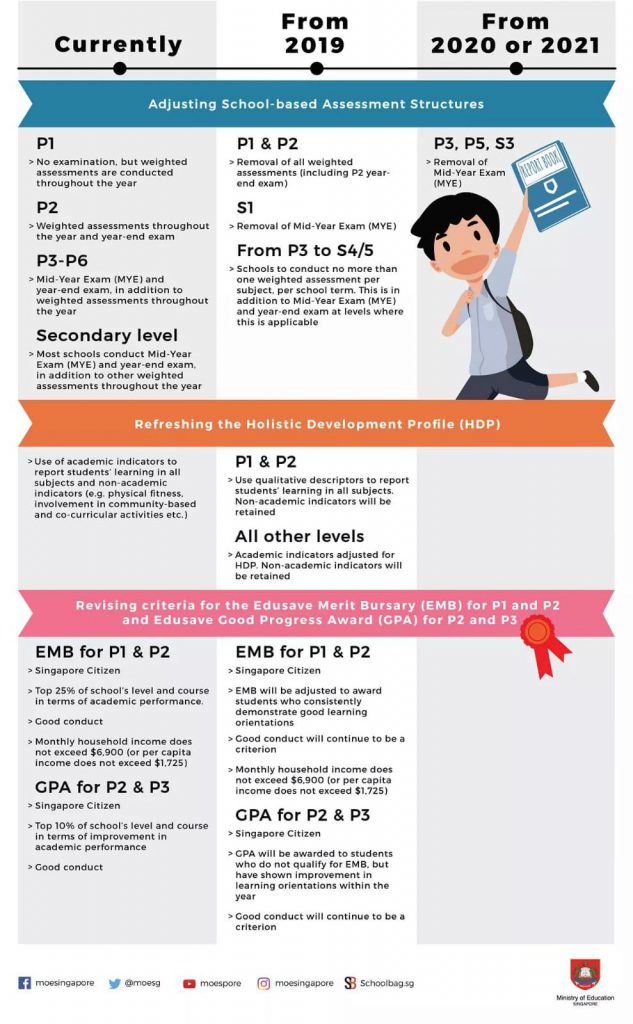
KIDS WILL BECOME UNPRODUCTIVE
Let’s think about our own childhood for a moment and try to remember a time we studied because we genuinely wanted to study. Chances are, the only time we studied that diligently was when we had to for exams.
"Exam period was the only time I could get my son to study properly. It’s going to be hard to get him to study now." - Lavenia, parent of 7-year-old in P1Like NTB2DO in the screen capture above, several users on the HardwareZone forum have been discussing the move since MOE’s announcement. While a handful of these users were just complacent Singaporeans without children, just eager to put their opinions out there, there is an abundance of those who shared their legit concerns on what this would mean for their children’s future. We cannot expect children (or anyone) to enjoy taking exams, but it’s undeniable that exams have significantly pushed many children to be a little bit more disciplined and studious. We also can’t deny the amount of distractions kids have these days. Back when millennials were children ourselves, all we had were our Barbie dolls, Game Boy and a handful of other toys and we still managed to get distracted. Just look at how many distractions kids have today. “I’m definitely worried that my son will spend more time playing more games and what not," says Lavenia. Could this mean more pressure for parents to supervise their children?
UNPREPAREDNESS WILL LEAD TO STRESS
One of the reasons behind removing exams for P1 and P2 is to remove unnecessary stress that we’re embedding into young children. However, I call bullshit on the idea that having exams at that age causes unnecessary stress to children. Exams aren’t the main cause of stress in a child. Try and recall if you felt stress at taking exams at that age. Unless you had a tiger mom or dad, you probably didn’t feel any overwhelming amount of stress from exams. HardwareZone user NTB2DO gives us another great example:
“I would want my daughter to be exposed to going through an exam in P1 or P2 at least, because she’d have more time to warm-up before her streaming year.” – Ilena, parent of a child enrolling into P1 next yearWith the pressure from their parents, coupled with how they're going to be introduced to 'the exam environment', students could find themselves in a more stressful situation than before.
DOESN’T CHANGE THE ‘GRADES ARE EVERYTHING’ MINDSET
It’s no secret that most Singaporeans highly value academic success, and while MOE has good intentions, the recent change will not fully address the “kiasu” mentality instilled within Singaporeans. The mentality that grades and academic growth triumphs everything else. Exams or no exams, we’ve grown up associating success with how well we do in school. We grew up having our parents, teachers, and society as a whole assess us based on our academic qualifications. Let’s face it, these children will still be assessed this way when they eventually progress to their last years in primary and secondary school and so on. And the best way to achieve the As to get them to their ‘ideal schools’ is still by mugging and memorising pages and pages of information. Because the better your memory, the higher your likelihood of scoring an A, right? To make things worse, who can forget how our parents just had to compare us to our siblings, friends, cousins and even neighbours when we 'didn't do as well’. This 'tradition' lives on even until today, and it isn’t just the children. Parents are feeling the pressure themselves.“I feel intense pressure coming from kiasu parents all around me. The competitive academic culture and the pressures that it places on parents and thus on children are very real.” - Germaine, parent of a child enrolling into P1 next yearAccording to Germaine, parents around her are sending their kids for enrichment classes that teach them to read, spell, and solve math problems way before the enter primary school. Everyone wants their child to be the best in the race, and this consequently contradicts MOE’s stance of wanting to focus more on kids’ personal development over academics in the first two years of primary school.
“If parents and teachers continue to stress over the consequences of not getting good grades, we’ll be right back where we started.” - Esther, parent of 7-year-old in P1
A GOOD FIRST STEP, WITH ROOM FOR IMPROVEMENT
While MOE’s latest move is commendable, it’s a shame that it just may not be enough. Yes, taking away exams lets kids be kids a little longer. Yes, removing rankings from report cards do help to discourage comparisons amongst peers. And yes, there shouldn’t be emphasis on grades down to the decimal point. But in an education system that deems a student a failure solely based on their grades, change doesn’t happen overnight. These are great initial steps but to truly make a change, MOE and parents have to unite and understand each others concerns as well. Be it changing the curriculum to include more experiential learning methods, or overhauling the entire education system, whatever step MOE decides to take next, it must take into consideration not only how it affects schools and students, but how it affects parents. Only when the changes address the prevailing concerns then will Singaporeans be convinced that there will be real change. Also read, In Defense Of My Arts Degree: Why The Arts Are Absolutely Essential (Header Photo by pan xiaozhen on Unsplash)Complementing the messages of preventing STDs were lessons on using condoms for safe sex. Naturally, watching a grown adult roll a condom down a banana stood out for many.“‘Don’t have sex or you’ll get pregnant and die!’ - something that I took away when they taught us about sexually transmitted diseases (STDs) in secondary 3” – Aisha, 25
“When learning how to wear a condom properly with the use of a banana as example, they told us, ‘always remember to the pinch the top!’” – Natasha, 27

SINGAPORE’S ABSTINENCE-ONLY APPROACH
The Ministry of Education (MOE) values abstinence as the best approach in the prevention of STDs and unwanted pregnancies. But this is unrealistic. Teens are having sex, and it’s silly for anyone to think otherwise. That makes it all the more crucial that teens are provided with necessary information to help them in make informed choices. Instilling fear of STDs and AIDS in them isn’t going to work.The more you tell a teenager not to do something, the more s/he will do it. Rather than trying to prevent the impossible i.e. teenagers having sex, and living with the idealistic mindset that teens will abstain till marriage, schools should address the obvious straight-on. It’s time sex education lessons started giving students answers to questions that they shouldn’t be looking for on Google.“I remember that a lot of the focus was not really on the process, but on the DANGERS of unsafe sex. Telling teenagers ‘DO NOT HAVE SEX, YOU WILL GET HERPES’ just makes them scared to seek help if they need it.” – Melissa, 28

“It was a lot of out-dated scaremongering and it didn't maturely teach teenagers how to practice safe sex at a point in their lives where they would be naturally sexually curious, if not already active.” – Nikki, 25It is a problem and we need to rethink the way we teach sex education because it is invaluable knowledge that will impact the rest of our lives. Abstinence and encouraging safe sex are good messages, but there are many bigger concerns that teens will come to have when they become sexually active.
LET'S TALK ABOUT CONTRACEPTION
Aside from teaching teens how to put a condom on a banana, our sex education barely touches on birth control and contraception.“The school was so obsessed with talking about the dangers of sex that they didn't give us practical advice, like informing us about the various forms of birth control and where to get them.” – Sophia, 23As a teenage girl myself once, I knew close to nothing about contraceptives. I had only heard about condoms and learnt about the existence of birth control pills through movies and television. When I reached a stage in my life when I had to use it, I jumped to Google to gather all the information I now know about contraception. I wish my school would have given me a “Contraceptives 101” crash course (or even a sex education talk worth remembering). Let’s take the image below for example. It shows us the various methods of contraception. Even looking at it now, I can’t say that I am entirely sure how some of these contraceptives work. Can I Google it? Sure. But I shouldn’t have to.

REAL-WORLD SITUATIONS
As parents to a teenage daughter, my parents became extra paranoid about the people I hung out with once I hit puberty. And by people, I mean boys. The compelling need to protect daughters from danger has been ingrained into people’s minds for centuries. There’s a chronic fear when it comes to raising daughters that no one openly talks about, but we all know it’s there. Conversations like these are often kept hush-hush. But how can we hope to eliminate a fear without talking about it? There have been many cases over the past couple of months that have opened up a can of worms over the concept of consent before or during sex. “If a girl doesn’t say no, does it mean yes?” “But they’re in a relationship, still need to ask permission meh?” “The girl knew what she was getting into the moment she started making out with him.” Be it the Eden Ang controversy, or the<a href=" RP graduate who got flamed online for her blog post describing an incident that occurred between her and her then-boyfriend, these “discussions” have warranted that we re-evaluate the way we think and talk about sex. Talking about abstinence doesn’t help when you find yourself in a situation beyond your control. And knowing about the consequences of unsafe sex (STDs) wouldn’t matter when it’s too late to prevent it. Concerns that sex education should also touch on include dealing with undesirable situations. For example, teaching girls and boys about consent. The United Kingdom has recently reformed its sex education program to include lessons on consent as well. Being able to ask and clarify before making an advance, saying no to unwanted advances and understanding the verbal and visual cues of consent are all important in creating a safer space for teens not just in schools, but outside school grounds as well. Talking about the issue with their peers and discussing and clarifying their concerns with educators can help teens understand what a healthy relationship looks like.“Boys should know to ask for consent and to cope with their sexual urgencies and girls should be empowered to say 'no' if they don't want to have sex.” – Victoria, 26Sex needs to be openly discussed. By keeping this conversation confined behind closed classroom doors and separating girls and boys during this talk, we’re only reinforcing the message that sex is “bad” and “wrong”. If we teach sex education the way we teach students Math, for example, we’ll be creating a safe space where students wouldn’t need to shy away from seeking help if ever they find themselves in a predicament. And if teens today find themselves feeling confused or conflicted like we once did, all they'd need to do, is ask. While the act of sex may be done behind closed doors, the conversation shouldn’t have to be. Also read: Let's Talk About Sex: 15 S'poreans On Whether Sexual Compatibility Is Important In A Relationship
THE PRESSURE TO STAY BACK
I recently came across an Instagram story a friend, Jason*, posted. In it, he shared about how he had left work at 6pm sharp, only to have one of his colleagues pass a snide comment at him, "wah today go home so early.” That comment may very well be passed off as a joke, but that wasn’t the first time Jason’s colleague made such comments. It happens every time Jason leaves work on time and it shows an underlying problem that is apparent in our work culture. It's worth noting that Jason gets to work at 9am, finishes all that is required for the day and leaves the office between 6pm to 6.30pm regularly. So on that fine day, Jason finally gave his snarky colleague a comeback, “Oh, hahaha, but I also come to work on time.”
GIF by GIPHY
But this story isn't about giving snarky people a taste of their own medicine, it's about the unhealthy association we have with working OT and employee's value. As if an outlet that everyone was waiting for, Jason's story received an outpour of positive replies from friends and followers who had also experienced similar situations.“Going home on time isn’t a crime and OT-ing isn’t a prize.”
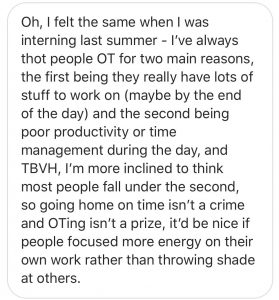 Truer words could not have been spoken.
Truer words could not have been spoken.

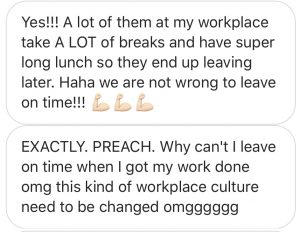
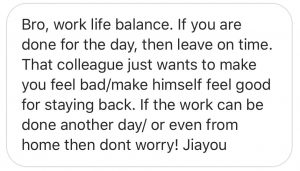 Clearly, Jason isn't alone in this.
Most of us have been in Jason's position at some point of our career. Somehow, we feel obliged to stay back beyond our designated knock off time, especially when everyone around us seems to be glued to their seats.
In fact in our society today, staying back late is deemed a positive trait. It's not surprising for bosses to have the impression that an employee OTing in the office till 10pm is a hardworking one. When did staying late at work translate to employee dedication or value? And who's to say employees don't use that mentality to their benefit, exploiting it to show their "dedication" for their work?
Contrarily, no one would instinctively think of an employee who leaves office on time as an A-star employee.
Because of such workplace beliefs, we feel paiseh to be the first one out the door. We choose to stare at our screens in the office just because our other colleagues are doing so. Of course, I'm not implying that everyone OT for that sole reason because some really do have to get shit done. However, many of us have been a victim to this guilt and the fear that we will be looked down upon.
It's a worrying mindset to have and kind of sad. Instead of prioritising productivity and good time management, we tend to patronise employees who leave on time and favour those who stay late, even if it could mean that they lack the two aforementioned skills.
Clearly, Jason isn't alone in this.
Most of us have been in Jason's position at some point of our career. Somehow, we feel obliged to stay back beyond our designated knock off time, especially when everyone around us seems to be glued to their seats.
In fact in our society today, staying back late is deemed a positive trait. It's not surprising for bosses to have the impression that an employee OTing in the office till 10pm is a hardworking one. When did staying late at work translate to employee dedication or value? And who's to say employees don't use that mentality to their benefit, exploiting it to show their "dedication" for their work?
Contrarily, no one would instinctively think of an employee who leaves office on time as an A-star employee.
Because of such workplace beliefs, we feel paiseh to be the first one out the door. We choose to stare at our screens in the office just because our other colleagues are doing so. Of course, I'm not implying that everyone OT for that sole reason because some really do have to get shit done. However, many of us have been a victim to this guilt and the fear that we will be looked down upon.
It's a worrying mindset to have and kind of sad. Instead of prioritising productivity and good time management, we tend to patronise employees who leave on time and favour those who stay late, even if it could mean that they lack the two aforementioned skills.
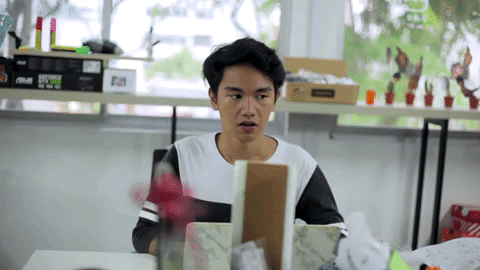
STOP TORTURING YOURSELF
This unnecessary societal pressure is further egged on by something that is innately Singaporean: our "kiasu" mentality. We always want to be better than the person next to us. It's a national sport to be competitive and this mentality manifests itself in the hours we put into work. It cultivates an unhealthy showcase of competition where everyone wants to show that they're putting in equal, if not more effort than our peers. If we weren't all caught up in the rat race, there wouldn't be a need to do OT just to prove our worth in the first place. Ask anyone to choose between work or family and friends with the context that their livelihood isn't a problem and chances are most will choose family and friends. A survey from 2016 showed that about 50% Singaporeans said they don’t spend enough quality time with their family. With figures like these, it’s no surprise that Singaporeans constantly look like they're in need of a Red Bull. I know that we millennials like to think that we're invincible and while we're still young, we see the need to strive and work harder for better days. But everyone needs work-life balance.
Not only does staying late affect our social life, it affects our physical and mental health. Working late into the night and waking up at 6am or 7am the next day for work again is only going to leave us drained. Besides, we've seen the many research studies that link stress and fatigue to decreased productivity.
Even our eyes need a break from the computer screen every 20 minutes. We need to give our minds and a body a break. The less rest we get, the less productive we’ll be at work the next day, which leads to the need to OT and the vicious cycle repeats.
Do we really want to live our life in an endless loop of feeling stoned? I certainly don't want to go about my life like 'the working dead'.
I know that we millennials like to think that we're invincible and while we're still young, we see the need to strive and work harder for better days. But everyone needs work-life balance.
Not only does staying late affect our social life, it affects our physical and mental health. Working late into the night and waking up at 6am or 7am the next day for work again is only going to leave us drained. Besides, we've seen the many research studies that link stress and fatigue to decreased productivity.
Even our eyes need a break from the computer screen every 20 minutes. We need to give our minds and a body a break. The less rest we get, the less productive we’ll be at work the next day, which leads to the need to OT and the vicious cycle repeats.
Do we really want to live our life in an endless loop of feeling stoned? I certainly don't want to go about my life like 'the working dead'.
 We are human beings after all and the stress and mental fatigue that build up with constant OT should not be taken lightly. 'Death from overwork' is real - after clocking in more than 100 hours of overtime in a month, Matsuri Takahashi killed herself at the age of 24, and hers is not the only case in Japan that have been ruled 'death from overwork'.
I'm thankful that the situation in Singapore isn't as drastic, but I also hope we never have to see that headline on local news.
We are human beings after all and the stress and mental fatigue that build up with constant OT should not be taken lightly. 'Death from overwork' is real - after clocking in more than 100 hours of overtime in a month, Matsuri Takahashi killed herself at the age of 24, and hers is not the only case in Japan that have been ruled 'death from overwork'.
I'm thankful that the situation in Singapore isn't as drastic, but I also hope we never have to see that headline on local news.
WORK-LIFE BALANCE DOESN’T HAVE TO BE A MYTH
Many of us today believe that work-life balance is simply not possible. “No such thing one lah!” We say. On the other hand, I have friends in countries like Australia, who tell me how they are blessed with employers who encourage them to leave work on time. One of them even shared that her employer had told her to go home two hours early because she had finished what she had to do for the day. Holler at me if you find an employer who would do that in Singapore. Working hours were made to be 8 hours for a reason. Whether it's to make sure people don't go insane from work or whatsoever, there's no need to stay back in the office unless we really need to - like to complete urgent projects or client deadlines that we die-die have to finish. Remember that at the end of the day, we work to earn a living, but is it worth it to be only living for work?
It’s cool if you want to be a Jason. If you're done with work, go forth and leave the damn office when the clock strikes six. And if your bosses don't seem to comprehend the concept of productivity and that you are human, you can decide if you're paid enough to sell your life to work.
And if you’re someone who likes to take a lot of breaks during the day because you just work better at night, that’s great too. Just, maybe, refrain from being condescending to those who leave on time.
*Name has been changed to prevent the individual from losing his job.
Also read: “It’s Just My Job” – Not All Insurance Agents Are Annoying Assholes
Remember that at the end of the day, we work to earn a living, but is it worth it to be only living for work?
It’s cool if you want to be a Jason. If you're done with work, go forth and leave the damn office when the clock strikes six. And if your bosses don't seem to comprehend the concept of productivity and that you are human, you can decide if you're paid enough to sell your life to work.
And if you’re someone who likes to take a lot of breaks during the day because you just work better at night, that’s great too. Just, maybe, refrain from being condescending to those who leave on time.
*Name has been changed to prevent the individual from losing his job.
Also read: “It’s Just My Job” – Not All Insurance Agents Are Annoying Assholes



